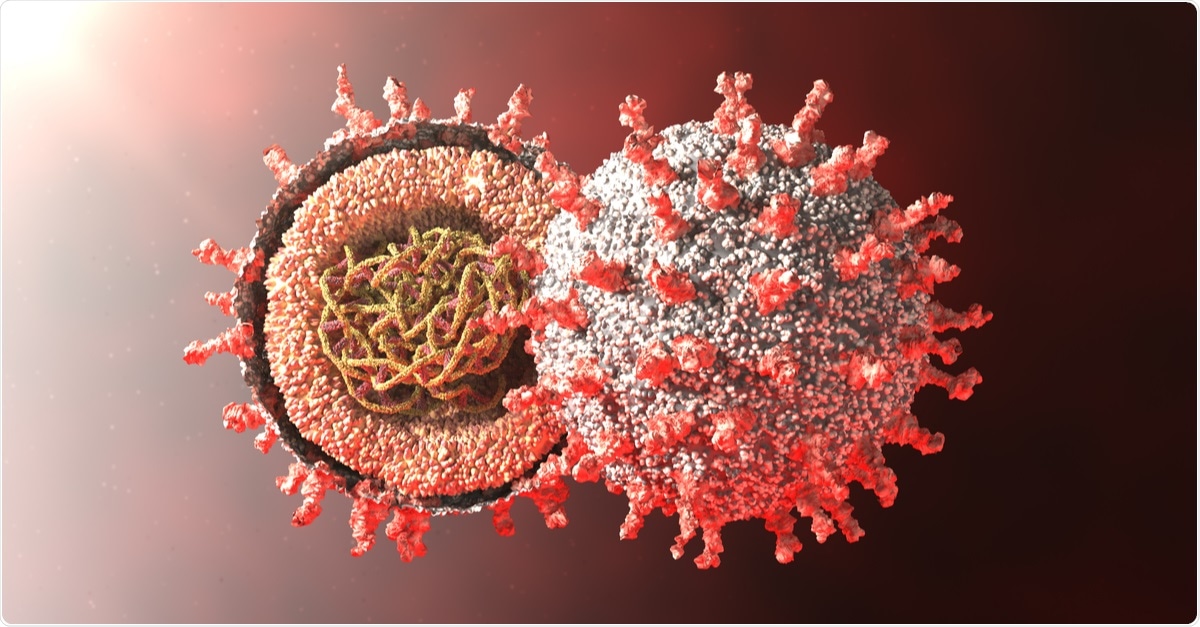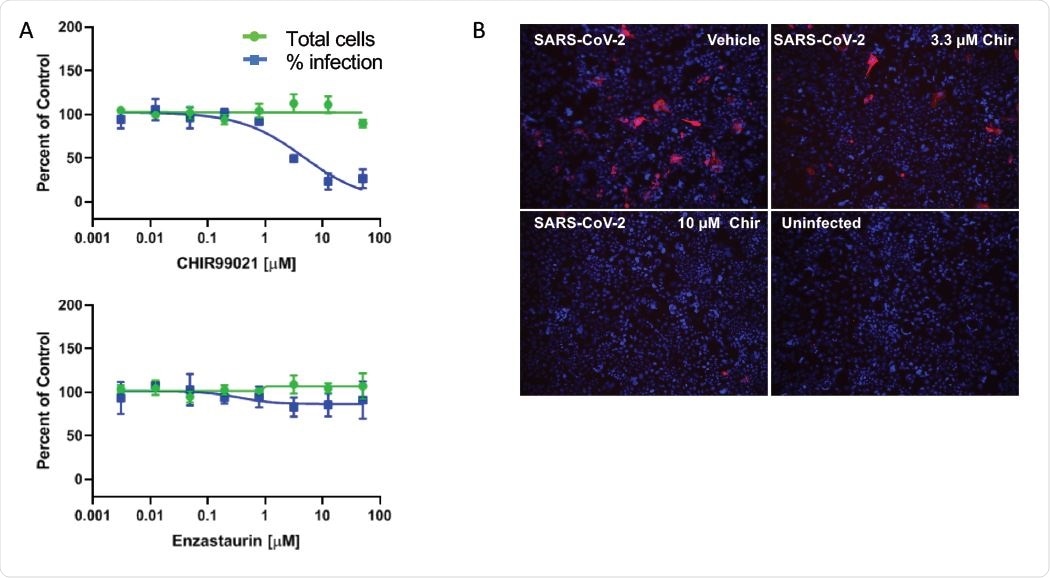GSK-3 inhibitors show promise in treating coronavirus infections

Researchers in the United States have suggested a new approach to treating infection with coronaviruses such as severe acute respiratory syndrome coronavirus 2 (SARS-CoV-2) – the agent that causes coronavirus disease 2019 (COVID-19).
The study showed that inhibiting phosphorylation of a key structural protein expressed on coronaviruses impaired SARS-CoV-2 infection in human lung epithelial cells.
The team used inhibitors of the host cell protein glycogen synthase kinase 3 (GSK-3) to block phosphorylation of the SARS-CoV-2 nucleocapsid protein that is essential for coronavirus replication.
The researchers also demonstrated that the GSK-3 inhibitor lithium was associated with a significantly reduced risk for COVID-19
“Targeting GSK-3 may therefore provide an antiviral therapy for COVID-19 and for coronavirus infections that may arise in the future,” says Peter Klein from the University of Pennsylvania and colleagues.
A pre-print version of the research paper is available on the medRxiv* server, while the article undergoes peer review.

Coronavirus outbreaks are likely to occur in the future
Klein and colleagues warn that given the major coronavirus outbreaks that have occurred over the last two decades, it is likely that further outbreaks will occur in the future.
“In addition to the development of effective vaccines, antiviral strategies that target conserved mechanisms in coronavirus replication and transmission may be needed for COVID-19 and potential future coronavirus outbreaks,” they say.
What is already known about the nucleocapsid protein?
The nucleocapsid (N) protein is essential for coronavirus replication, transcription and assembly.
However, N protein expressed by the SARS-CoV-1 virus (that caused the 2002-2004 SARS outbreak) requires phosphorylation by host cell GSK-3 at the arginine-serine (RS) domain.
Furthermore, the GSK-3 inhibitor lithium, which is already a common therapy for bipolar disorder, impairs the replication of various coronaviruses, including SARS-CoV-1, porcine epidemic diarrhea virus, and transmissible gastroenteritis virus.
“Interfering with the conserved dependence of the N protein on the host protein GSK-3 may be a viable approach to treat COVID-19 and potential future coronavirus outbreaks,” writes Klein and the team.
Studies have already shown that despite the N protein of SARS-CoV-1 only sharing 20–30% sequence identity with the N proteins of many other coronaviruses, all of the viruses have an RS domain that lies between N-terminal and C-terminal conserved domains.
The RS domain of the SARS-CoV-1 N protein includes repeated motifs (SXXXS) that are frequently associated with GSK-3 phosphorylation.
Furthermore, one study recently found that SARS-CoV-2 N protein is highly phosphorylated within the RS domain. However, no studies to date have tested whether GSK-3 phosphorylates SARS-CoV-2 N protein or whether lithium exerts any antiviral effect against SARS-CoV-2.
What did the researchers do?
Now, Klein and colleagues have shown that the RS domain of the SARS-CoV-2 N protein is 90% similar to that of the SARS-CoV-1 N protein and that they each contain two sets of three SXXXS motifs.
Although the N protein sequences of other coronaviruses diverge, the team also showed that they still retain SXXXS motifs.
“As we find GSK-3 consensus sites in the N proteins of diverse coronaviruses, GSK-3 inhibitors may also be effective antiviral therapy in other coronavirus infections, including those that may arise in the future,” say the researchers.
Next, Klein and colleagues tested the effects of various GSK-3 inhibitors on SARS-CoV-2 N protein expressed in human embryonic kidney 293T cells.
They found that lithium chloride and multiple other small-molecule GSK-3 inhibitors, including CHIR99021, AR-A014418, and Enzastaurin, all inhibited N phosphorylation, strongly supporting that GSK-3 is essential for N protein phosphorylation.
Furthermore, the team found that the GSK-3 inhibitor CHIR99021 also impaired replication of SARS-CoV-2 in the human lung epithelium-derived cell line Calu-3.
ddd

Testing whether lithium reduces the risk of COVID-19
Since lithium is already widely used to treat bipolar disorder, the researchers investigated whether patients taking lithium are at a reduced risk of developing COVID-19, compared with the general population.
They conducted a retrospective analysis of data from three major health systems in the United States.
The researchers included data for 121,589 individuals from the University of Pennsylvania Health System (UPHS), 115,073 from Mount Sinai Medical Center (MSMC), and 102,420 from the University of Iowa Hospitals and Clinics (UIHC). All of the patients had been tested for SARS-CoV-2 by polymerase chain reaction (PCR) as of February 2021.
Among these individuals, 8,856 (7.2%) patients from UPHS, 10,597 (9.2%) patients from MSMC, and 16,170 (15.8%) patients from UIHC were confirmed SARS-CoV-2 positive.
Across all three health systems, 7% of patients who were taking lithium developed COVID-19, compared with 15% among the general population.
Furthermore, a meta-analysis of the data using a random-effects model showed that patients taking lithium were 49% less likely to develop COVID-19 than patients who were not taking lithium.
What did the authors conclude?
The team proposes that inhibition of N protein phosphorylation underlies the antiviral activity of lithium and other GSK-3 inhibitors against SARS-CoV-2.
“Developing GSK-3 inhibitors that safely and effectively inhibit N phosphorylation is a promising potential approach to controlling SARS-CoV-2 and other coronavirus infections that may arise in the future,” says Klein and colleagues.
The researchers also point out that the approach is based on a clear mechanism and utilizes clinically-tested, well-tolerated drugs that could be rapidly repurposed for COVID-19.
*Important Notice
medRxiv publishes preliminary scientific reports that are not peer-reviewed and, therefore, should not be regarded as conclusive, guide clinical practice/health-related behavior, or treated as established information.
- Klein PS, et al. Targeting the Coronavirus Nucleocapsid Protein through GSK-3 Inhibition. medRxiv, 2021. doi: https://doi.org/10.1101/2021.02.17.21251933, https://www.medrxiv.org/content/10.1101/2021.02.17.21251933v1
Posted in: Medical Research News | Disease/Infection News
Tags: Arginine, Bipolar Disorder, Cell, Cell Line, Coronavirus, Coronavirus Disease COVID-19, Diarrhea, Drugs, Gastroenteritis, Health Systems, Kidney, Kinase, Lithium, Molecule, Phosphorylation, Polymerase, Polymerase Chain Reaction, Protein, Research, Respiratory, SARS, SARS-CoV-2, Serine, Severe Acute Respiratory, Severe Acute Respiratory Syndrome, Spike Protein, Structural Protein, Syndrome, Transcription, Virus

Written by
Sally Robertson
Sally first developed an interest in medical communications when she took on the role of Journal Development Editor for BioMed Central (BMC), after having graduated with a degree in biomedical science from Greenwich University.
Source: Read Full Article



